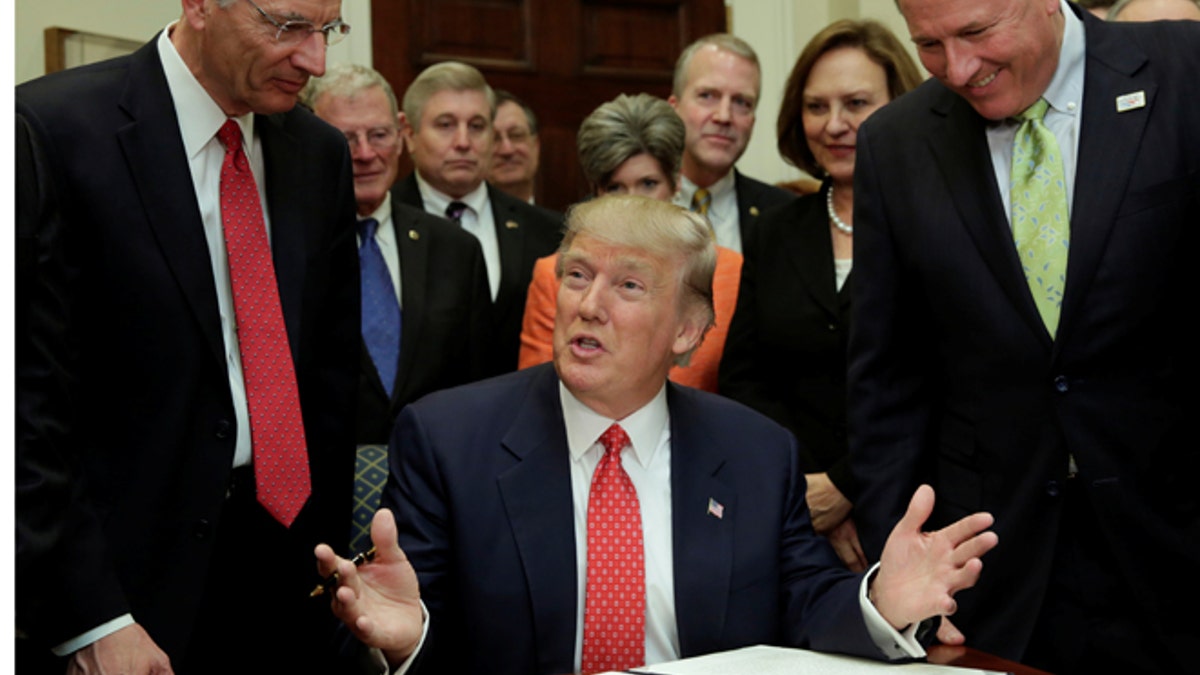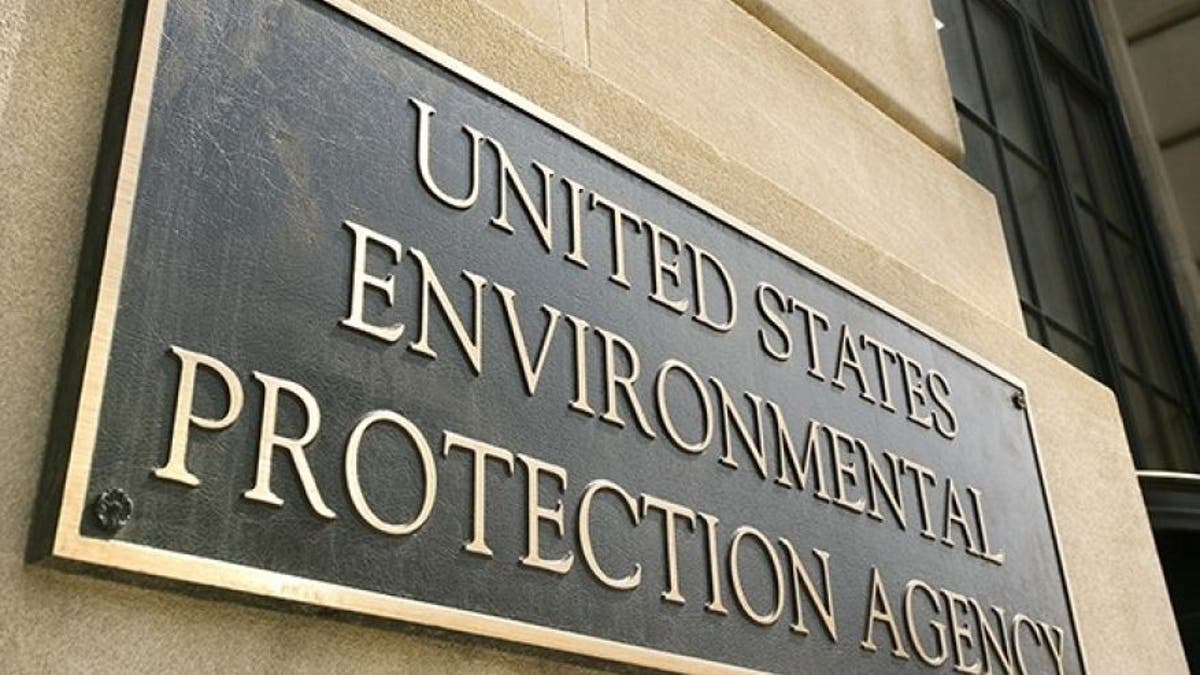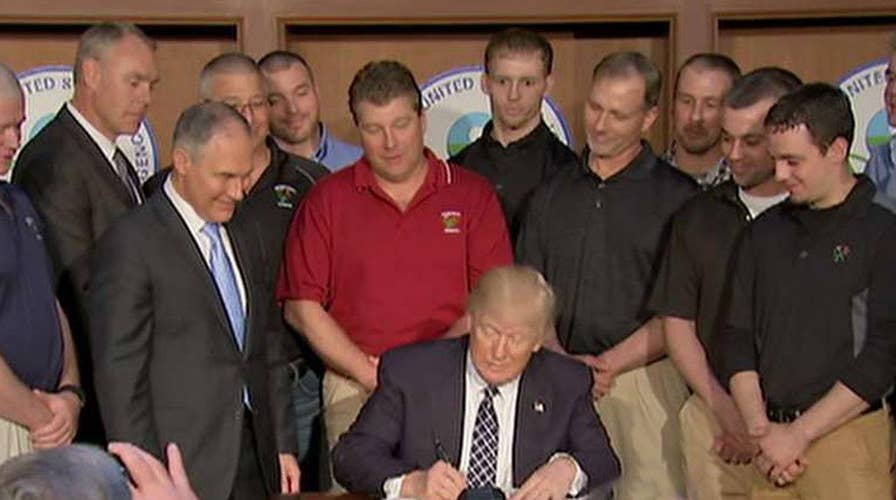Executive order rolls back Obama environmental regulations
FBN's Blake Burman reports from the White House
Attorneys for an energy company being sued by the federal government say lawyers for the Environmental Protection Agency are defying one of President Trump’s executive orders that, if obeyed, would essentially kill the agency's lawsuit against the company.
The accusation against the EPA, and their Justice Department (DOJ) lawyers, is the latest episode in a five-year-old fight between the federal government and California-based HVI Cat Canyon, a privately-held oil company formerly known as Greka Oil & Gas.
In 2011, the federal government and the state of California sued HVI for various environmental offenses, including violating the Clean Water and Pollution Act, by spilling tar-like oil at least 21 times into drainage ditches. The government classified those ditches as “navigable waters” and thus protected under federal regulations.
Two years ago the case against HVI got a boost when President Barack Obama signed the “Waters of the United States” rule, which expanded the definition of “navigable waters” to include “intermittent streams” -- that is, streams that sometimes had no water in them.
In February, President Trump signed an executive order directing the EPA and the Army Corps of Engineers to review Obama’s expanded definition of navigable waters with a view to rescinding it.
Then last month, EPA Administrator Scott Pruitt said that, besides beginning the review Trump’s executive order called for, he also would “consider interpreting the term ‘navigable waters,’ as defined in the Clean Water and Pollution Act in a manner consistent with the opinion of Justice [Antonin] Scalia in [the 2006 case known as] Rapanos.” The late Supreme Court justice wrote in a 2006 minority opinion in Rapanos v. the United States that the Clean Water Act confers federal jurisdiction over non-navigable waters only if the waters exhibit a relatively permanent flow, such as a river, lake or stream. In other words, “intermittent streams” wouldn’t qualify as navigable waters, and thus wouldn’t be protected under federal law.
Lawyers for HVI assert that the government’s case against the company will fail if the EPA and the Corps use the interpretation of “navigable water" put down by Scalia as the drainage ditches “only carry water a handful of days a year” and argue the case at the very least be suspended until the rules in Trump’s executive order are implemented.
Some legal experts, however, say Trump’s executive order may be less significant than HVI’s lawyers maintain.

U.S. President Donald Trump greets guests after signing the water executive order at the White House, in Washington, DC, U.S. February 28, 2017. (REUTERS/Yuri Gripas)
"The executive order said that the EPA should consider adopting Justice Scalia's opinion," Joseph Dellapenna, a visiting professor at the University of Houston Law Center, told Fox News. "The EPA has not done anything about this yet except to say they will look into it."
While HVI lawyers haven’t gone so far as to accuse the DOJ lawyers of a so-called “deep state” rebellion, the company’s legal counsel does say the department’s continued pursuit of the case is “deeply troubling” and “an explicit rejection of the policies announced by President Trump.”
“As we have never before encountered such a blatant disregard of the official direction of the President of the United States among government lawyers, we feel compelled to ask that you put an end to the willful obstruction of President Trump’s announced policies by dismissing this case over which the United States has no jurisdiction,” Robert O’Brien, a lawyer at Larson O’Brien, wrote in a letter last month to Attorney General Jeff Sessions.
In a response to O’Brien’s request, dated March 28, Mark Sabath of the DOJ’s Environmental Enforcement Section said that Acting Assistant Attorney General Jeffrey Wood had reviewed the request and that “the position of the United States with respect to this case has not changed.”
It is unclear whether or not Attorney General Sessions is aware of the case as the Department of Justice declined Fox News’ request for comment. The EPA did not return a request for comment.

"The [company’s] law firm is arguing on a flimsy basis, but that is not to say that Attorney General Sessions won't buy it," Dellapenna said.
A source close to the case, however, told Fox News that DOJ’s reluctance to drop the litigation was due in large part to career bureaucrats and Obama-era appointees looking to undermine Trump’s authority and policies.
“I don’t want to sound like a conspiracy theorist, but the only logical explanation here is that Obama’s holdovers are trying to keep his policies from being replaced,” the source, who requested anonymity due to the sensitive nature of the case, told Fox News. “A ‘deep state’ effort is the only logical explanation here. People are trying to keep Obama’s policies and screw HVI Cat Canyon.”
There is no evidence pointing to any effort by employees at either the DOJ or the EPA to undermine Trump’s executive order, but suspicions over discord within government offices have arisen amid allegations that an EPA press release last month that was critical of the president came about as a result of infighting between longtime agency officials and Trump administration appointees.
The criticism came in a quote from Sen. Tom Carper, D-Del., that was inaccurately attributed by the EPA to Sen. Shelley Moore Capito, R-W.Va..
“President Trump has chosen to recklessly bury his head in the sand,” said the quote at the top of the EPA press release in reaction to Trump’s executive order rolling back Obama’s climate initiatives.
The quote added that the order "calls into question America’s credibility," and that Trump and Pruitt "have chosen to shirk our responsibility, disregard clear science and undo the significant progress our country has made.”
The agency quickly issued a new version of the email, which also corrected the spelling of Capito's first name.













































